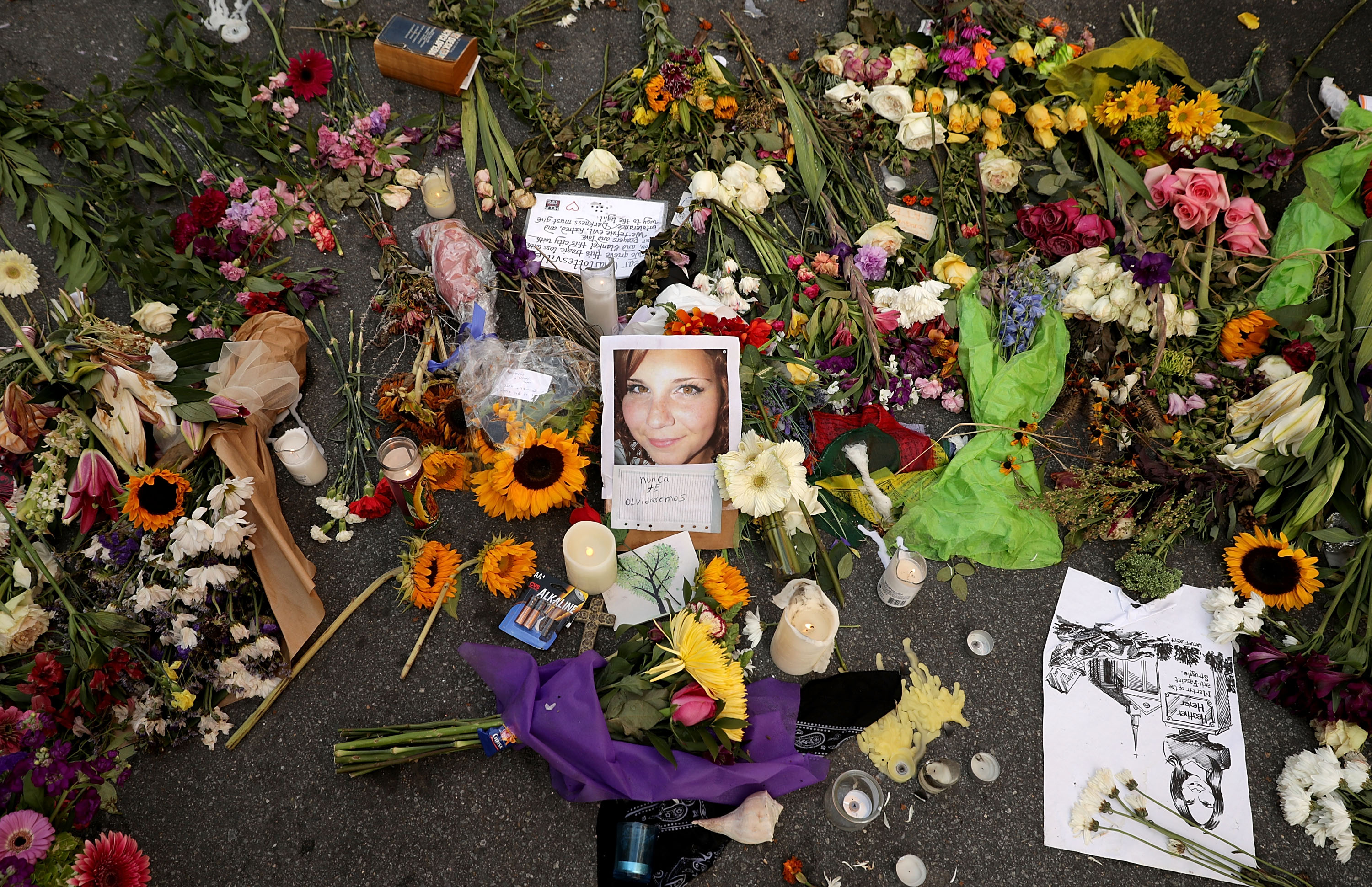The scourge of right-wing terrorism
The next president will need to be ready


America has experienced a slew of terrorist attacks over the last year from secret ISIS cells across the country. One man drove his car through a crowd of demonstrators, killing one of them, another murdered a gay Jewish man, and another stabbed two people to death on a train. Overall at least 20 people were killed in this way in 2017 — more than twice as many as the previous year.
Just kidding! I was actually referring to right-wing extremists who have done all those things. Everyone can return to their normal daily business.
In seriousness, it's becoming increasingly apparent that the United States has a sizable right-wing terrorism problem, and authorities are not doing nearly enough to combat the problem. It's something the next presidential administration will have to be prepared for.
The Week
Escape your echo chamber. Get the facts behind the news, plus analysis from multiple perspectives.

Sign up for The Week's Free Newsletters
From our morning news briefing to a weekly Good News Newsletter, get the best of The Week delivered directly to your inbox.
From our morning news briefing to a weekly Good News Newsletter, get the best of The Week delivered directly to your inbox.
Now, that is not to endorse the psychotically belligerent response law enforcement typically uses against suspected Islamist terrorists. There is no need to stack every conservative evangelical church with informants trying to incite gullible or mentally ill parishioners into committing acts of terror, or to assassinate extremist right-wing propagandists (and occasionally their children) with drone strikes, or to throw Milo Yiannopoulos and Richard Spencer in Guantanamo Bay without trial indefinitely.
Furthermore, the universe of violence in this country is many orders of magnitude greater than that of terrorism. Murders, assaults, suicides, and car crashes happen in the tens of thousands every year, not dozens. Those problems deserve a priority arguably well above terrorism.
Nevertheless, there is something especially upsetting about politically-motivated spectacular violence, and there's nothing wrong with dedicating special attention to stopping it, so long as we do not shred the entire Bill of Rights in the process. For one thing, law enforcement resources can absolutely be dedicated to tracking guns (which would require federal legislation), materials to build explosives, and other such items. Investigative police work to penetrate extremist groups — see this ProPublica report on a neo-Nazi terrorist cell — can disrupt terror before it happens, while successful investigations and prosecutions can raise some deterrent. (Some terrorists are fanatical enough to commit suicide in the process, of course, but others are closer to play-acting and might be scared off.)
Perhaps most importantly, authorities can attempt to de-radicalize people. Violent confrontation can easily backfire and fuel even more extremism, as seen in Waco and Ruby Ridge. But platform monopolists like Facebook and YouTube could be regulated to stop the way their algorithms spread extremist propaganda without firing a shot. Or more directly, groups can work with individuals to talk them back from the edge, as the group Life Against Hate does.
A free daily email with the biggest news stories of the day – and the best features from TheWeek.com
Of course, there is basically zero reason to think the Trump administration will do this. Indeed, after the 2016 election, Life After Hate received a 20-fold increase in requests from people worried their friends or family members might be becoming extremists — but in mid-2017, the Department of Homeland Security canceled a planned $400,000 grant to the group without explanation. The latest policy from Attorney General Jeff Sessions is pursuing the death penalty for drug dealers.
One likely reason for this is because President Trump has been notably reluctant to condemn right-wing extremists. He infamously defended the white supremacists who organized the Charlottesville rally in which a neo-Nazi murdered Heather Heyer, saying there were "fine people" among them and blaming the violence on "both sides," including a supposed "alt-left."
However, that isn't the first time such a reversal has happened. Back in early 2009, conservatives flipped out over a completely sensible DHS report on right-wing extremism, which was actually planned and written by Bush-era personnel. Nevertheless, then-DHS Secretary Janet Napolitano was forced to walk back much of the report, particularly apologizing to veterans, who had been identified as possible recruits for extremist groups. (Can't imagine where they got that idea.)
Whoever replaces Trump will need a stiffer resolve than that. Despite a certain backlash from conservatives, motivated by whatever combination of fevered anti-government paranoia and active sympathy with extremism they happen to have, the next president will need to persevere and deflate the threat of right-wing terror. That doesn't mean a paroxysm of repression, but it does mean careful and deliberate action to keep religious and ethnic minorities, immigrants, and other vulnerable communities safe from violent extremism.
Ryan Cooper is a national correspondent at TheWeek.com. His work has appeared in the Washington Monthly, The New Republic, and the Washington Post.
-
 How to financially prepare for divorce
How to financially prepare for divorceThe Explainer Facing ‘irreconcilable differences’ does not have to be financially devastating
-
 Why it’s important to shop around for a mortgage and what to look for
Why it’s important to shop around for a mortgage and what to look forThe Explainer You can save big by comparing different mortgage offers
-
 4 ways to save on rising health care costs
4 ways to save on rising health care costsThe Explainer Health care expenses are part of an overall increase in the cost of living for Americans
-
 Bari Weiss’ ‘60 Minutes’ scandal is about more than one report
Bari Weiss’ ‘60 Minutes’ scandal is about more than one reportIN THE SPOTLIGHT By blocking an approved segment on a controversial prison holding US deportees in El Salvador, the editor-in-chief of CBS News has become the main story
-
 Has Zohran Mamdani shown the Democrats how to win again?
Has Zohran Mamdani shown the Democrats how to win again?Today’s Big Question New York City mayoral election touted as victory for left-wing populists but moderate centrist wins elsewhere present more complex path for Democratic Party
-
 Millions turn out for anti-Trump ‘No Kings’ rallies
Millions turn out for anti-Trump ‘No Kings’ ralliesSpeed Read An estimated 7 million people participated, 2 million more than at the first ‘No Kings’ protest in June
-
 Ghislaine Maxwell: angling for a Trump pardon
Ghislaine Maxwell: angling for a Trump pardonTalking Point Convicted sex trafficker's testimony could shed new light on president's links to Jeffrey Epstein
-
 The last words and final moments of 40 presidents
The last words and final moments of 40 presidentsThe Explainer Some are eloquent quotes worthy of the holders of the highest office in the nation, and others... aren't
-
 The JFK files: the truth at last?
The JFK files: the truth at last?In The Spotlight More than 64,000 previously classified documents relating the 1963 assassination of John F. Kennedy have been released by the Trump administration
-
 'Seriously, not literally': how should the world take Donald Trump?
'Seriously, not literally': how should the world take Donald Trump?Today's big question White House rhetoric and reality look likely to become increasingly blurred
-
 Will Trump's 'madman' strategy pay off?
Will Trump's 'madman' strategy pay off?Today's Big Question Incoming US president likes to seem unpredictable but, this time round, world leaders could be wise to his playbook
